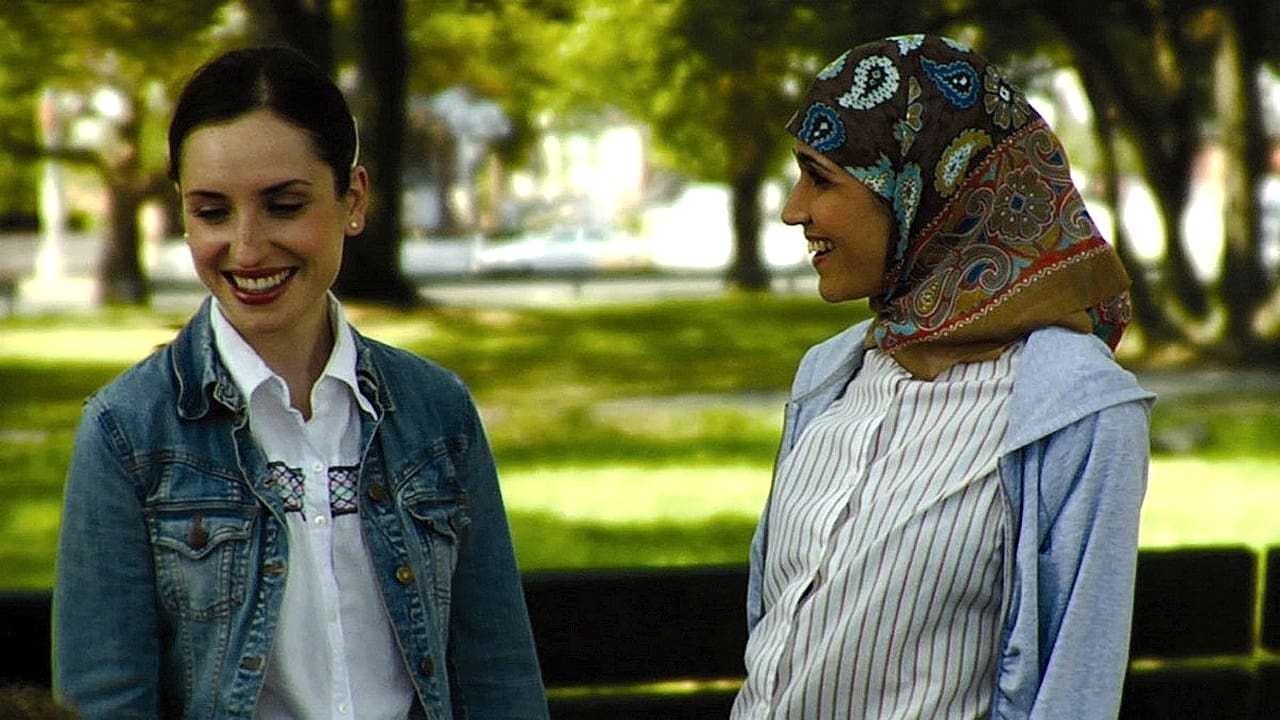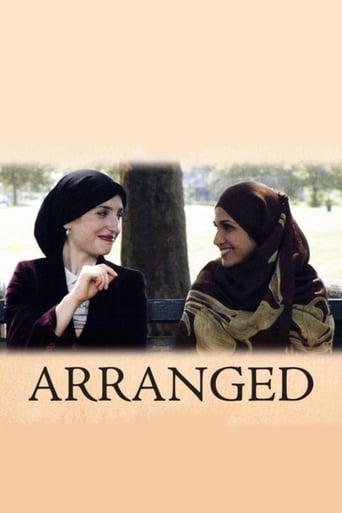

If you're looking for a film which addresses the issues of arranged marriage, this is not it.Two young women, one Jewish one Islamic, both belonging to families which are strict to their respective religions, start up a friendship and end up helping each other through the hazards and dilemmas of arranged marriage.The conflict throughout this story is very light. It only really gets heated at one point near the end when a pro-womens' lib head teacher is told to back off (and you can almost hear the director applauding). Yes, the film-makers leave you in no doubt where they stand and make sure to avoid any deeper reflection on the subject. Just when you think some kind of drama may be about to kick off, the film does an about turn and heads for the emergency exit (signed 'COP OUT').Of course, there are happy arranged marriages. But do we need this kind of saccharine-sweet depiction? There was a film about non-arranged marriages made in the 70s which ends with the wives wheeling their shopping trolleys around a store like zombies - it's called The Stepford Wives. Arranged has a similar end scene, but even more chilling considering the film-makers intended this to warm your heart.You could try watching this film and imagining it's a sci-fi movie set in alternative reality where women's lib never caught on. Or maybe you're up for an arranged marriage and you need convincing.
... View MoreWhat a remarkable film. I cannot tell you anything about who made it, why it was made, who financed it, who the main actors were and what they've done before this.I cannot say anything much about the music, the setting, or the technical details that make a great film. None of those details matter.What does matter is that it is an engaging film that speaks of the only way that Jews and Muslims are ever going to solve their difficulties.It must begin with women and not just ordinary women, but women of great incite and tolerance and dare I use the word, love.Both cultures have the word in their religion's vocabulary. The film seems to be saying learn what it means, and how to use it. The film takes for granted that both these women know what friendship means. They are bound not so much by their differences as their similarities.Basically, the plot revolves around two modern women (or at least women who have grown up in a modern world) of vastly different backgrounds. They meet at the school where they will both be teaching. One, a Muslim, has been assigned a regular grade 4 class and the other, a Jew, has been assigned to special Education - her main assignment seems to be a blind boy who understands the workings of the soul almost as well as his teacher. Certainly, he is more practical and a lot more jovial.The grade 4 class brings the problem into direct focus. They have obviously watched too much Fox News. They think that all Jews have horns (according to their Arab Neighbors) and all Arabs are bloodthirsty terrorists (according to the Jewish media). These two women work together on an idea developed by the Special Ed teacher to show that prejudice can be overcome by groups that don't allow hatred and ugly connotative words to develop at inflexibly deep levels.The scenes that follow all have to do with welcoming strangers into one's home (The Muslim family does, the Jewish one does not), choices in marriage (both girls have a problem with this, but only the Jewish woman has a problem with her family as well) or the talk that binds their friendship.I know that life is not that simple, but if we do not find alternatives to the hatred in the planet, then we will live in a hate-infested planet. Someone has to have the courage to write and speak about what can be done, not what is done. We need hopes, not 6:00 news. We need laughter and understanding, not tears and hatred. We need what this film offers.I gave this film a 10 because it offered us choices, and it did so in a way that compromises nothing of our beliefs, and did everything it could to enhance our humanity. It did it with humor, good will, common sense and a little bit of cunning, but just a little.
... View MoreOthers have commented on this film's many assets and fewer flaws, many of which I agree with. Two flaws that have not been touched upon continue to bother me days after seeing the film. Both may be considered SPOILERS, though if I had known of them before seeing the film, it would not have reduced my enjoyment. First flaw: After Nasira's Muslim faith becomes an issue for the children in the classroom, Rochel arranges, with Nasira's consent, a "Unity Circle" in the classroom to teach the children about the problem of labeling. The children get to choose a word that they think best describes them, hold the word up in front of them, and then in turn explain why it describes them. After each explanation, the other kids vote on whether that boy or girl should be allowed to stay in the circle. That works well enough for the first 2 or 3 kids, but then a boy is expelled from the circle for choosing "nasty" to describe himself. The kids agree that only after revising his word to something acceptable would the boy be allowed back into the circle. Rochel and Nasira look approvingly at each other at this turn of events as if some important lesson in tolerance has been taught and learned here, but what lesson is that? That we get to decide what labels are OK for others? What would have been unacceptable grounds for being cast out of the circle? If an African-American child had chosen "Black" to describe herself, would it have been OK to expel her, and to readmit her only if she revised her descriptor to something more acceptable to the group, like "White"? Would "Jewish" or "Muslim" have been acceptable grounds for being cast out? These questions are never explored, and so the point of this intended major exercise in tolerance was lost on me. The second flaw I want to call attention to is the writing of the Principal's character. Rather early in the film, she has the two women in her office. She bemoans the fact that such fine teachers will be lost to students after just a year or two because they'll get married and start having children, and she tries to persuade them to modernize, even to update their wardrobes. All that makes sense in the context of the rest of her character, but not what she does next, which is to pull a roll of money out of her purse and offer to fund their shopping expedition. (As if a principal would carry a roll of money in her purse, anyway.) The rest of the conversation is in character. The money offer is not. Further (SPOILER ALERT), the Principal is in fact correct that when the women marry and have babies within the next year, it is, as she said, a substantial waste of the women's training, certainly from the institutional perspective of the school and the government, and perhaps also from the perspective of the two women.
... View MoreArranged is a feel-good movie with a message. The story concerns two young women who are teachers in a Brooklyn, New York, elementary school. Nasira, the teacher of the fourth grade class is a woman from a traditional Muslim family. Rochel - from an Orthodox Jewish family - is the special needs aid from a legally blind boy in the class. The students raise the question as to whether the two hate each other because it is the understanding that all Jews hate and want to kill all Muslims and vice-versa. The two women become close friends while working together to dispel these prejudicial thoughts of the students.Both of these young women are bright, caring people in touch with society, but they are both from traditional families that share the common tradition of arranged marriages. Thus, they are both suffering the crisis of being modern, vital women bound to a tradition of an ancient time. However, they are both respectful of the tradition and their families.I must admit that watching this film was somewhat of an education for me. Personally, I pretty much disdain the practices of organized religions because history has witnessed so much harm committed in their names, but seeing these two young women work out their problems was very insightful. There is an interesting character in the film who pretty much expresses my thoughts - and probably the thoughts of many others not privy to the intimate feelings of those who observe the guidelines of traditional religions. The character is Principal Jacoby. She cannot understand why these two smart young women would harness themselves to traditions that are so far removed from modern society and liberated women. Unfortunately, Jacoby's thoughts are expressed in a less-than-cordial way - shocking but with a comic touch.An ironic twist to this film for me comes from a recent conversation with my brother. He's not as avid a television drama watcher as myself and was saying to me recently that he hadn't watched much on television lately, but when he did, it seemed that it was usually some program from the Law and Order stable of shows. After I had watched Arranged, I happened across a Law and Order repeat in which the actress who played Rochel was featured. I had already recognized the actress who plays Principal Jacoby as a repeating character on the series, so I decided to do some research. Of the fourteen leading actors in Arranged, nine have appeared in some form of Law and Order, and some have played repeating characters. One of the major reasons that the Law and Order programs have been continuing successes is the quality of the acting. That quality extends to Arranged.Principal Jacoby is played by Marcia Jean Kurtz whose most memorable Law and Order role was that of Carla Lowenstein - first played in 1990 and reprised in 2004. She played the emotionally abused wife of a noted doctor who abused and murdered his child. I cannot remember the names of the "ripped from the headlines" real doctor and wife, but Kurtz's performance was shocking and unforgettable. In Arranged, she shows her considerable range.Rochel is played by Zoe Lister Jones who gives us a woman who is outwardly shy but in possession of keen insight and an independent spirit to be truly admired. She is a beautiful and highly competent actor.Francis Benhamou (not a Law and Order alum) plays Nasira as a woman bound to tradition but with a spark and wit not to be dimmed by obstacles that arise. She is a delight to watch in this role.The DVD is distributed by Film Movement (filmmovement.com). If you are interested in independent films, you might wish to check them out. I have not always enjoyed the selections of this group but one thing I can say is that all of their films are certainly interesting.Many people feel is that you cannot take seriously a movie with a happy ending because life in general does not have a happy ending. I generally tend to agree that most lives do not have happy endings but there's nothing that says we cannot enjoy the thought. Arranged certainly gives you that enjoyment.
... View More